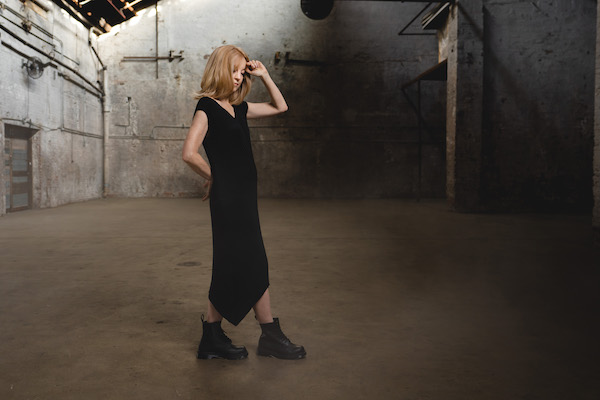Jan 13, 2026 2:09 PM
More Trump-Kennedy Center Cancellations
The fallout from the renaming of the John F. Kennedy Center for the Performing Arts to include President Donald…

Maria Schneider’s new release is a double album titled Data Lords.
(Photo: Briene Lermitte)Our Natural World finds Schneider tuning out the distractions of the digital world to embrace the things to which she is authentically drawn, such as landscapes, the sky, people, poetry, art and silence. Tunefulness and light come streaming through on tracks like “Sanzenin” (a Gary Versace accordion feature inspired by ancient Japanese temple gardens), “Stone Song” (which makes use of a whimsical piece of pottery), “Look Up” (composed with trombonist Marshall Gilkes’ silky timbre in mind), “Braided Together” (inspired by Ted Kooser’s poetry), “Bluebird” (featuring great solos by Versace and alto saxophonist Steve Wilson) and “The Sun Waited For Me” (a chorale-like piece on which Gilkes and tenor saxophonist Donny McCaslin bask in vibrant glory). The windows are wide open in this natural world, and there’s ample space for the music to breathe.
Together, the two discs of Data Lords are the product of Schneider’s involuntary reaction to everything going on around her in both the digital and natural realms. She never intended to record a double album—until the idea was suggested by a friend, and she realized that it made perfect sense.
“I was thinking about the fact that I was writing music, and I would like to record it, but it was all so polarized,” she said. “One piece was about a garden in Japan, and then there was ‘Don’t Be Evil.’ And I was talking to one of my earliest ArtistShare participants, a wonderful guy named Justin Freed, and I said to him, ‘I don’t know how to record this—you can’t have an album that’s so schizophrenic in its feeling.’ He said, ‘Well, why don’t you make two albums?’ It gave me a gut ache to even consider it.
“But when I went home, I started thinking, ‘What is this music? Ultimately, what’s being said here?’ Because it wasn’t really conscious. And then I realized what it is: the polarization within myself, the struggle to hang on to that world that we’ve lost, that desire to just turn my phone off and go birding, and not be sucked into that other world. And music was coming out of that. I realized there was a lot of music I had written that was connected to art. Then I just thought, ‘Wow, this should be a double album, not two separate albums.’ It’s a concept I didn’t think of; it just appeared as a natural outgrowth of doing what I do.”
Much of the material on Data Lords bears the influence of the late rock artist David Bowie, who recruited Schneider to collaborate with him on “Sue (Or In A Season Of Crime),” from his 2014 compilation, Nothing Has Changed (Columbia). “These pieces were written not that long after I worked with David, who really drew my dark side out of me,” she said. “He was really into my older, darker music. And then with everything that was going on in my life, in terms of my activism about big data, it was a perfect storm that made this new music come out.”
No new Schneider composition is ever complete, though, until her esteemed band members get their hands on it. Scott Robinson, the band’s baritone saxophonist and woodwind doubler extraordinaire, has been with Schneider from the start. He compared the group’s approach to interpreting and refining Schneider’s compositions, under her direction, to a visual artist working with clay.
“One of the important qualities in Maria’s music is that everything is shaped in some way,” said Robinson, who travels the spaceways as the featured soloist on “Sputnik.” “You have to be a bit like a sculptor. You can never just play the notes—she won’t stand for that. She’s demanding in that way, and rightly so. It’s all about shaping a part and having it feel like each note grows out of the previous note and grows into the next note. When you’re in the band, you’re part of the process. And she always reminds us of this.”

Belá Fleck during an interview with Fredrika Whitfield on CNN.
Jan 13, 2026 2:09 PM
The fallout from the renaming of the John F. Kennedy Center for the Performing Arts to include President Donald…

Peplowski first came to prominence in legacy swing bands, including the final iteration of the Benny Goodman Orchestra, before beginning a solo career in the late 1980s.
Feb 3, 2026 12:10 AM
Ken Peplowski, a clarinetist and tenor saxophonist who straddled the worlds of traditional and modern jazz, died Feb. 2…

The success of Oregon’s first album, 1971’s Music Of Another Present Era, allowed Towner to establish a solo career.
Jan 19, 2026 5:02 PM
Ralph Towner, a guitarist and composer who blended multiple genres, including jazz — and throughout them all remained…

Rico’s Anti-Microbial Instrument Swab
Jan 19, 2026 2:48 PM
With this year’s NAMM Show right around the corner, we can look forward to plenty of new and innovative instruments…

Richie Beirach was particularly renowned for his approach to chromatic harmony, which he used to improvise reharmonizations of originals and standards.
Jan 27, 2026 11:19 AM
Richie Beirach, a pianist and composer who channeled a knowledge of modern classical music into his jazz practice,…